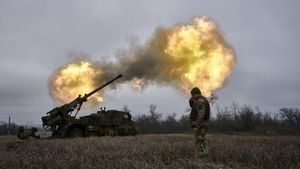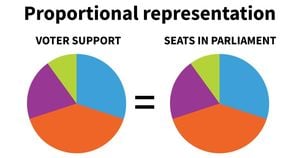South Korea, known for its vibrant democracy and dynamic society, recently experienced one of the most intense political crises since its establishment as a democratic nation. President Yoon Suk Yeol declared emergency martial law on December 3, 2024, citing the need to protect the country from what he described as "North Korean communist forces" and internal "antistate forces." This unprecedented move sent shockwaves through the political fabric of the country, igniting protests and parliamentary discord within hours of the announcement.
Yoon's declaration came during a nationally televised address, where he invoked the specter of North Korea's provocations as justification for his extreme measures. He argued, "I am declaring a state of emergency to protect the constitutional order based on freedom and eradicate shameful pro-North Korea anti-state groups, stealing freedom and happiness from our people." Notably, this is the first time martial law has been invoked since 1980, during another tumultuous period under military rule.
Following Yoon's remarks, the military swiftly moved to implement martial law, placing strict control over political activities and media across the nation. Reports indicated soldiers began occupying the National Assembly and enforcing bans on gatherings and protests. Yoon’s government warned of arrests for those who violated the martial law, asking all medical professionals to return to work immediately and signaling severe consequences for dissent.
Yet, the reaction from South Korea's vibrant civil society was quick and resolute. Just hours after Yoon's declaration, the National Assembly, heavily guarded and surrounded by demonstrators, mobilized to defy the president’s orders. A vote was swiftly called, resulting in 190 out of 300 lawmakers demanding the immediate revocation of martial law. This action underscored the strong pushback against what many viewed as Yoon’s authoritarian overreach.
At approximately 4:30 AM on December 4, President Yoon, faced with overwhelming parliamentary opposition and growing protests, announced the lifting of martial law. He described the vote by the National Assembly as decisive, hence his decision to backtrack. "I regret what happened today," he stated, reflecting the gravity of the situation.
The backdrop to Yoon's dramatic decision stretches back several months, rooted deeply in growing public discontent and political strife. His administration struggled with declining approval ratings recently hitting around 25%, exacerbated by accusations of corruption against his administration and persistent economic challenges. The Democratic Party, which secured around 60% of the parliamentary seats earlier this year, has clashed with Yoon on various fronts, from fiscal policy to legal repercussions for government officials.
Before martial law, South Korea saw increasing tensions among political factions. Yoon’s People Power Party criticized the Democratic Party-led parliament for cutting substantial expenditures from the proposed national budget, viewing it as sabotage to governance. Meanwhile, opposition leaders, including Lee Jae-myung, have been vocal against Yoon's leadership, labeling his government's actions as increasingly dictatorial and dangerous to democracy.
Considered by analysts as Yoon's desperate gamble to regain control, the martial law declaration reflects the high stakes of South Korean politics. Experts noted how extraordinary such measures appeared, especially against the backdrop of democratic norms. Edward Howell from Chatham House remarked, "It’s almost as if President Yoon went straight for the most extreme option first," alluding to the surprising nature of his declaration.
Following Yoon's reversal, the government was thrust back to debates on the budget and legal reforms pushed by the opposition. The chaotic scene outside the National Assembly, where protesters expressed their dissent against martial law, contrasted sharply with the tense atmosphere inside the legislative building, where lawmakers deliberated national governance and the future direction of Yoon's presidency.
The event has drawn international attention, with U.S. officials noting no prior warning about the martial law declaration. The U.S. State Department's response was cautious, monitoring the developments closely as South Korea remains one of its key allies amid rising geopolitical tensions with North Korea.
The fallout from this political storm could alter the dynamics of South Korean politics significantly. With public anger boiling over and Yoon's popularity plummeting, the road forward will likely involve greater scrutiny of his administration's actions and policies. The Democratic Party, buoyed by recent electoral victories, will undoubtedly seek ways to leverage this unprecedented moment, aiming to position itself as the defender of South Korean democracy.
This episode exposes vulnerabilities within South Korea's political framework and raises questions about the resilience of its democratic institutions. Will this crisis be the catalyst for reform or lead to more authoritarian governance? Only time will tell as citizens closely watch their leaders navigate the storm.



